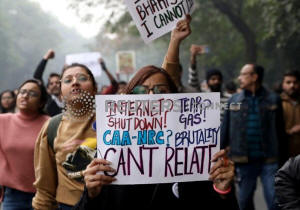Hundreds defy ban on protests against Indian citizenship law
 Send a link to a friend
Send a link to a friend
 [December 19, 2019]
By Devjyot Ghoshal [December 19, 2019]
By Devjyot Ghoshal
NEW DELHI (Reuters) - Hundreds of Indians
held for defying a ban on demonstrating against a controversial new
citizenship law continued their protest in police detention on Thursday.
Public anger over the new law widely considered to be discriminatory is
building across the country, with marches and rallies planned despite
bans on public gatherings in several areas, raising the possibility of
further violence and arrests.
The government ban has been imposed in parts of the capital New Delhi,
and throughout the states of Uttar Pradesh and Karnataka.
Police detained hundreds of people in Delhi and the southern city of
Bengaluru on Thursday and shut down the internet in some places as
protests entered a second week over a law that critics say undermines
India's secular constitution.
In the eastern state of Bihar, a senior police official said more than
200 protesters detained in a police campus in Patna started chanting
slogans against the law.
"We have detained the protesters but they cannot be silenced and we
don't want to threaten or use force to stop them," said senior police
officer Dhiraj Sinha.

FLIGHTS CANCELED
Airline IndiGO canceled 19 flights from Delhi as road traffic disruption
in the capital affected crew availability, an airport official said.
A further 16 flights were delayed, a number of metro stations in Delhi
were shut, as protests caused massive traffic disruption in the capital.
A senior home ministry official said maintaining law and order was a
state responsibility but reserve forces were ready to provide immediate
assistance.
Rights group Amnesty International has asked federal and state
governments to stop the crackdown on peaceful protests against what it
called a "discriminatory" citizenship law.
Defying the bans, protesters held rallies at Delhi's historic Red Fort
and a town hall in Bengaluru, but police rounded up people in the
vanguard of those demonstrations as they tried to get underway.
In Bengaluru, Ramchandra Guha, a respected historian and intellectual,
was taken away by police along with several other professors, according
to an aide.
"I am protesting non-violently, but look they are stopping us," said
Guha.
Police said they had detained around 200 people in the city, where
protest organizers said thousands attended four demonstrations on
Thursday.
[to top of second column]
|

Demonstrator display placards and shout slogans during a protest
against a new citizenship law, in New Delhi, India, December 19,
2019. REUTERS/Anushree Fadnavis

"We are here to peacefully demonstrate against this law," Mohammed
Maz, a bearded middle-aged protester, told Reuters as he was led
away by police in Delhi.
CONTROVERSIAL LAW
Prime Minister Narendra Modi has dug his heels in over the law that
lays out a path for people from minority religions in neighboring
Muslim countries - Afghanistan, Bangladesh and Pakistan - who had
settled in India before 2015 to obtain Indian citizenship.
Opponents of the law say the exclusion of Muslims betrays a
deep-seated bias against the community, which makes up 14% of
India's population, and that the law is the latest move by the
ruling Bharatiya Janata Party to marginalize them.
Train stations around Red Fort were shut to prevent protesters
joining the rally, and authorities also ordered mobile carriers to
suspend internet services in some parts of the capital.
"As per the directive received from the government, data services
are stopped at a few locations," Vodafone Idea's customer care
tweeted in response to a user's question about its network in Delhi.
On Sunday, police stormed New Delhi's Jamia Millia University,
firing tear gas and wielding batons to break up a protest by
hundreds of students, injuring scores.
During a violent protest in another part of the capital this week,
protesters, some masked, fought pitched battles with police.
Anger against Modi's government has burst into the open after a
series of moves that were seen as advancing a Hindu-first agenda in
a country that has long celebrated its diversity and secular
constitution.

(Additional reporting by Chandini Monappa and Nivedita Bhattacharjee
in Bengaluru, Neha Dasgupta, Aditi Shah in New Delhi, Saurabh Sharma
in Lucknow, Zarir Hussain in Guwahati, Rupam Jain in Mumbai, Writing
by Aftab Ahmed, Sanjeev Miglani and Rupam Jain; Editing by Simon
Cameron-Moore and Giles Elgood)
[© 2019 Thomson Reuters. All rights
reserved.]
Copyright 2019 Reuters. All rights reserved. This material may not be published,
broadcast, rewritten or redistributed.
Thompson Reuters is solely responsible for this content. |